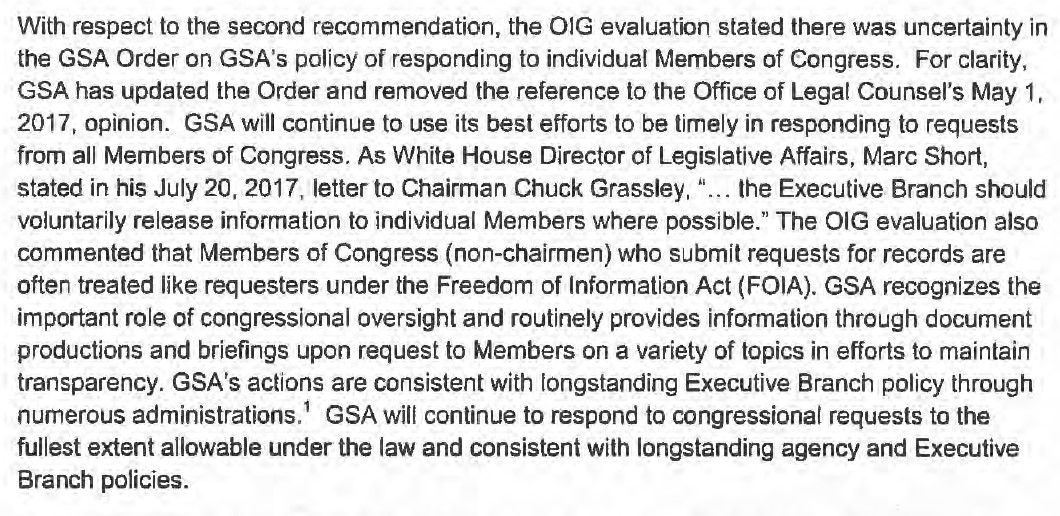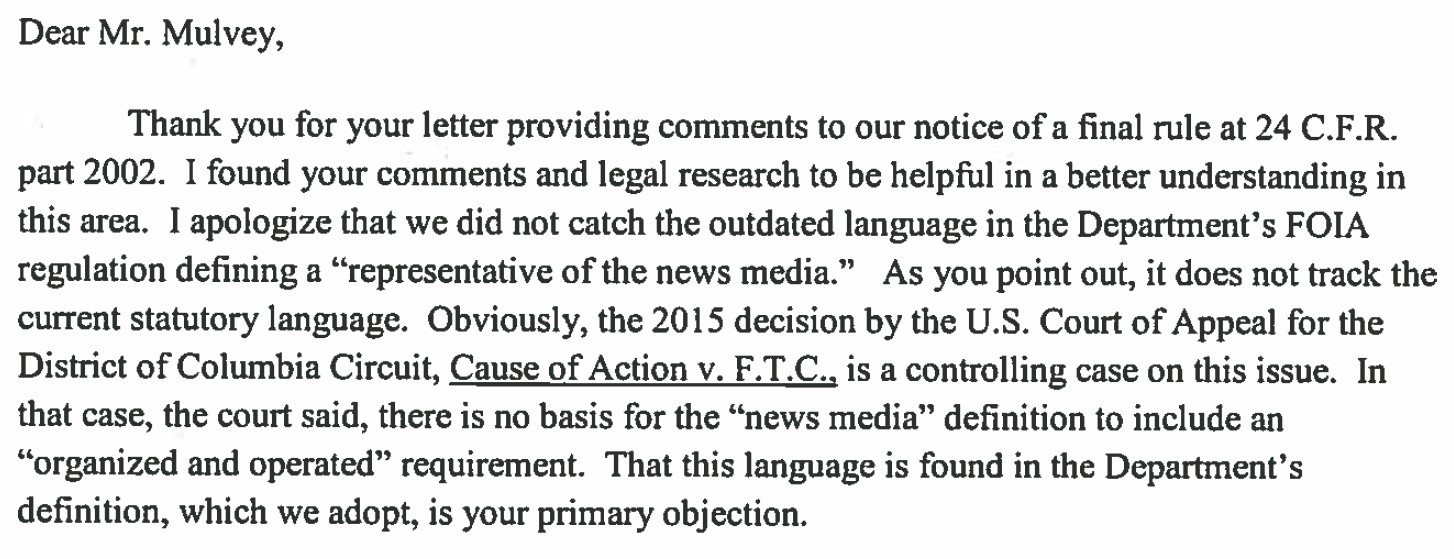A report published earlier this month by the General Services Administration (“GSA”) Inspector General (“IG”) provides new and illuminating, as well as concerning, details about the White House’s directives to agencies for responding to congressional oversight requests from Democratic legislators and other individual members of Congress. The IG report confirms that during the first seven months of the Trump Administration, the GSA implemented “a series of . . . unpublished policies that effectively amended” its procedures for handling congressional communications, just as the press and transparency community alleged. The report also concludes that the GSA’s latest published guidance, which was released in July 2017, is ambiguous because it does not reflect oral policies still in force and cites to a controversial May 2017 Department of Justice Office of Legal Counsel (“OLC”) opinion that the White House has publicly rejected. Most alarmingly, the IG report identified the underlying written basis for the GSA’s “oral” policy as a White House-created document, which is marked “presidential record” and is therefore “excluded from public disclosure under the Presidential Records Act.”
Cause of Action’s Investigation into the GSA Nondisclosure Policy
For the past year, Cause of Action Institute (“CoA Institute’) has been investigating rumors—now confirmed by the GSA IG—that the White House is directing federal agencies to ignore congressional oversight requests from Democratic legislators and individual Members who are not committee chairmen. Various reports in the media (here and here, for example) have detailed contentious interactions between congressional staffs and employees at the GSA and the Office of Personnel Management (“OPM”). According to some sources, White House attorney Uttam Dhillon is responsible for instructing agencies “not to cooperate” with record requests from the minority.
CoA Institute filed a Freedom of Information Act (“FOIA”) request with the GSA in an effort to verify what the Trump Administration’s actual policy might be. We asked for records concerning the “new policy” cited by the GSA’s Acting Administrator in testimony before Congress. We also asked the GSA for records reflecting directives or guidance originating with the White House. When the GSA finally provided its response, it left much to be desired. The GSA only released two documents: a February 20, 2015 order on congressional and intergovernmental inquiries, which is now obsolete, and an April 15, 2009 White House memo that CoA Institute already had made publicly known in June 2013.
We appealed that final determination, which prompted the GSA to release two additional records created during the Trump Administration. One of those records, a copy of the agency’s “updated Agency policy,” also known as GSA Order ADM 1040.3, was remarkable. As I discussed in a September 2017 op-ed in The Hill, although the White House had by then disavowed the OLC opinion letter as a statement of government-wide policy following harsh criticism by Senator Chuck Grassley, GSA Order ADM 1040.3, which is dated July 24, 2017, expressly cites to the OLC opinion as the GSA’s—and, presumably, the White House’s—official policy.
We then wrote to the GSA seeking public clarification, but that request went unanswered.
Our efforts to investigate OPM have been less fruitful. Last month, the agency responded to our FOIA request by disclosing a single email linking to the OLC opinion, but without further details concerning the opinion’s implementation or continued relevance. Our appeal challenging the adequacy of OPM’s search efforts, as well as its redaction of the responsive email, is pending.
The GSA’s Confusing Use of “Oral” Policies for Nondisclosure
The IG’s report goes into significant detail describing the evolution of the GSA’s nondisclosure policy under President Trump, but a few key findings stand out:
- The GSA developed a series of “oral” policies that “effectively amended” the GSA’s published procedures for dealing with Congress. These policies were formulated by the agency’s Senior White House Advisor and Acting General Counsel and disseminated throughout different agency components through “small in-person meetings,” “telephone calls,” and “hallway conversations.” This sort of official but unwritten policy development violated the GSA’s “internal policymaking directives.”
- This “oral” policy was continually modified. In March 2017, for example, the GSA decided to permit the disclosure of publicly available information or records that would otherwise be available under the FOIA to a non-congressional requester. At this point, the GSA’s FOIA office started to process certain requests before providing records to the congressional affairs office for final release. These changes were based on “guidance”—presumably, written—from the White House.
- In another instance, the GSA started to treat congressional requests under the “Seven Member Rule” as seven individual requests, thereby avoiding mandatory disclosure as required by 5 U.S.C. § 2954. This development was prompted by Ranking Member Elijah Cummings and other Democrats on the House Oversight Committee investigating the Trump Old Post Office lease.
- Once the GSA’s FOIA office started processing congressional requests, agency employees were unsure whether the FOIA’s procedural safeguards—such as the right to file an administrative appeal—applied.
- In one remarkable case, despite instructions from Chairman Jason Chaffetz of the House Oversight Committee to produce agency records to both the Majority and Minority staffs, the GSA intentionally neglected to do so. A senior agency advisor reported to the GSA White House Liaison and Senior White House Advisor that the “cc to [Ranking Member] Cummings” had been “take[n] off” the response to Chairman Chaffetz.
- The IG concluded that GSA’s nondisclosure policies did not contain vital whistleblower protection language required under federal law. Although the GSA has contested the IG’s interpretation of the law and its application in this context, the agency nevertheless agreed to change its published policies to include explicit whistleblower protection language.
The “Presidential Record” Underlying the Ongoing Problem
On May 19, 2017, the White House Office of Legislative Affairs provided the GSA with some “written guidance” on congressional oversight requests. This guidance apparently reflected the “oral” policy that had already developed at the GSA, which limited disclosures for non-chairmen to publicly available or publicly accessible records. This policy, and the underlying White House guidance, were the basis for the GSA Acting Administrator’s testimony before Congress. And it is this guidance that was marked as a “presidential record,” thereby removing it from access under the FOIA.
Continued Uncertainty about the GSA’s Actual Policy
According to the IG, GSA Order ADM 1040.3 is ambiguous because it does not reflect the unwritten policies that have remained in place at the GSA as late as December 2017, as reported by some officials. Indeed, two weeks after the order’s publication, and after the White House rejected the OLC opinion, the GSA’s Acting Commissioner for Public Buildings, in testimony before Congress, reiterated the GSA’s practice of responding only to committee chairmen. He intimated that this was “in line with the current Administration’s policy on responding to oversight questions.”
Ultimately, the lesson here is that unwritten policies, besides being bad from a transparency perspective, lead to confusion and inconsistency. The GSA IG concluded that many high-ranking officials at the GSA never fully understood the actual policy was for responding to congressional requests. Nor could they answer vital questions: What was the legal basis, if any, for the GSA’s policy? What was an “oversight” request? Were congressional members in their individual capacity really subject to the FOIA with all of the statute’s procedural safeguards? What role did the White House have in formulating the policy? Was it agency-specific, or indicative of a wider, government-wide policy change?
In response to the IG’s revelations, the GSA has agreed to remove any reference to the OLC opinion in Order ADM 1040.3. But the agency still insists on qualifying its commitment to processing disclosure requests from individual members based on unidentified “longstanding agency and Executive Branch policies.”
CoA Institute will continue to investigate this matter and the extent to which “oral” policies have influenced the processing of congressional oversight requests at other agencies. In the meantime, we have submitted a new FOIA request to the GSA, explicitly seeking the so-called “presidential records” that were the basis for the GSA’s unwritten policies. It is not clear why the Presidential Records Act should even apply in this instance.
Ryan Mulvey is Counsel at Cause of Action Institute




